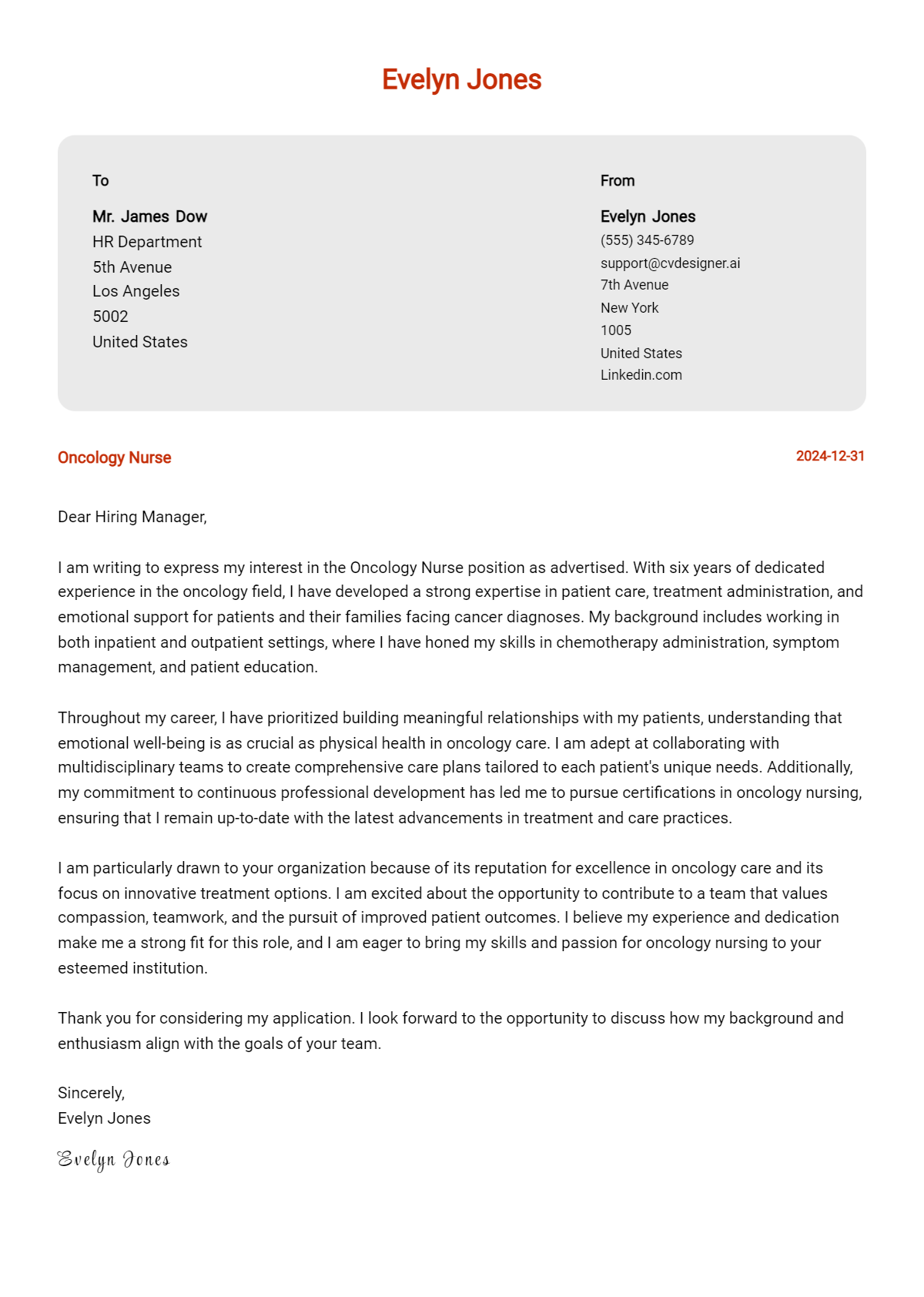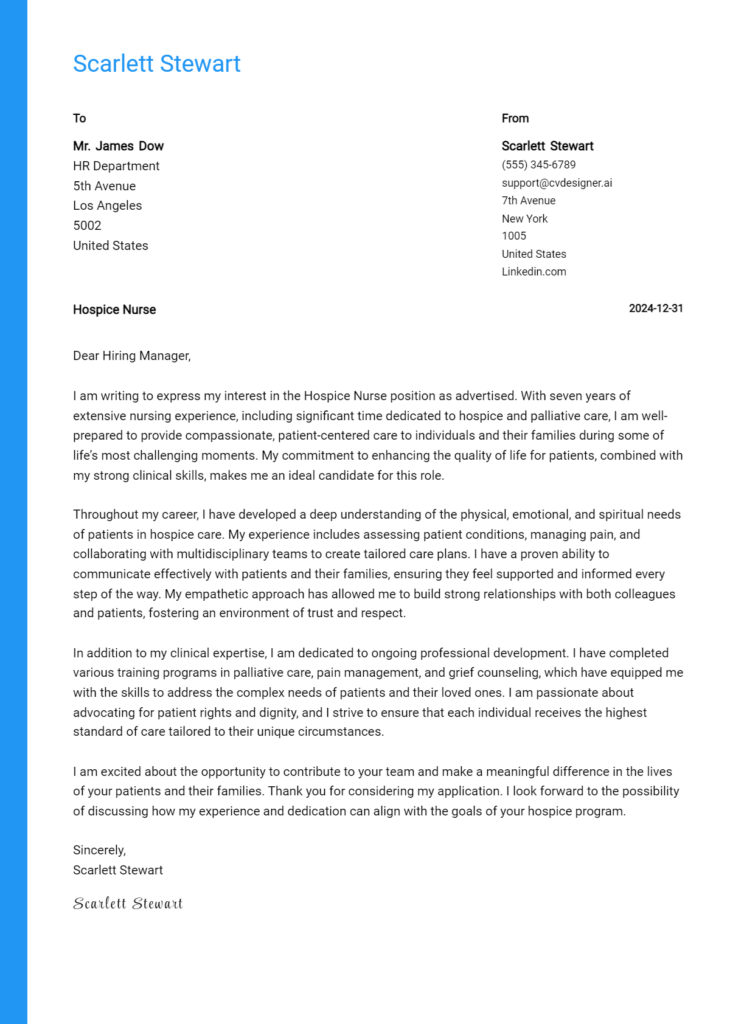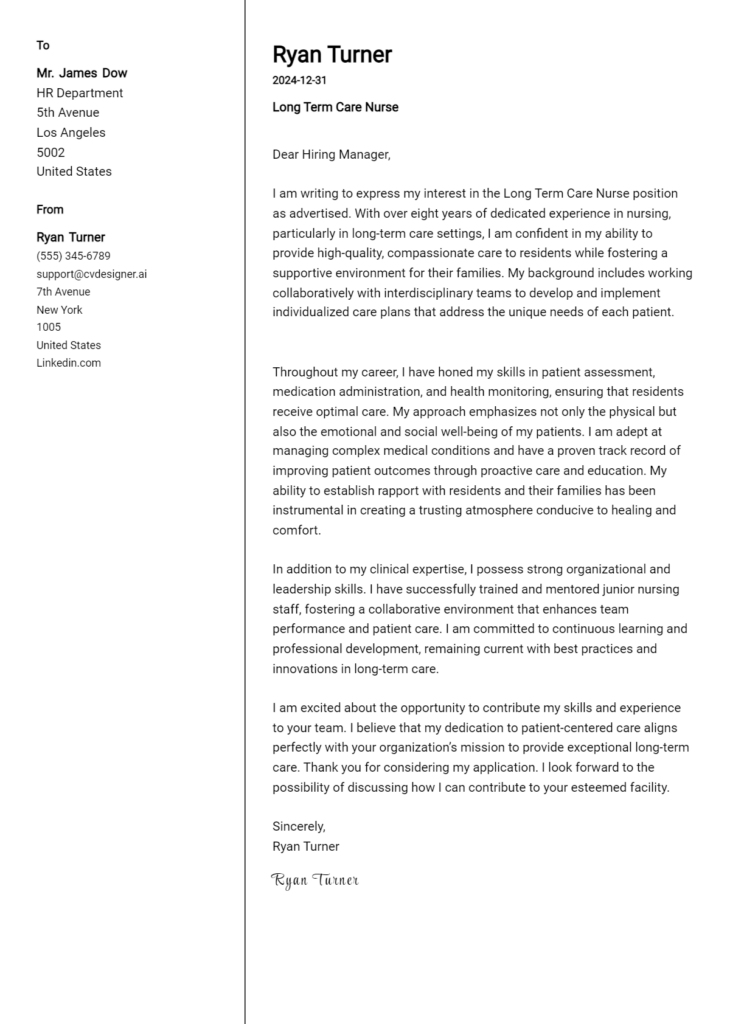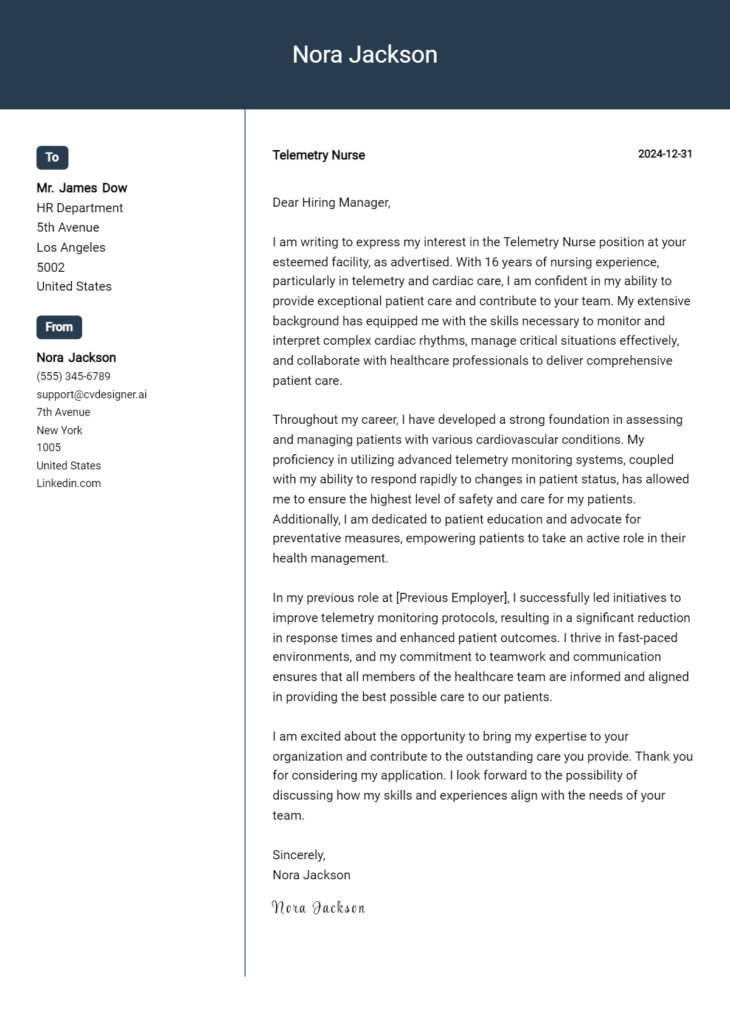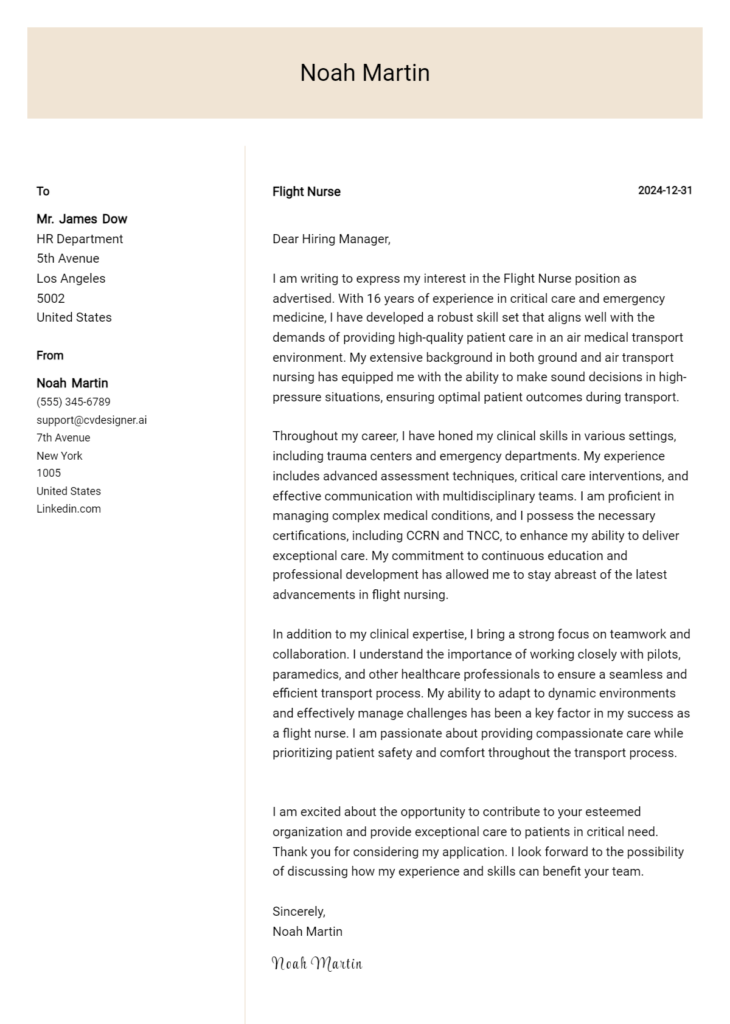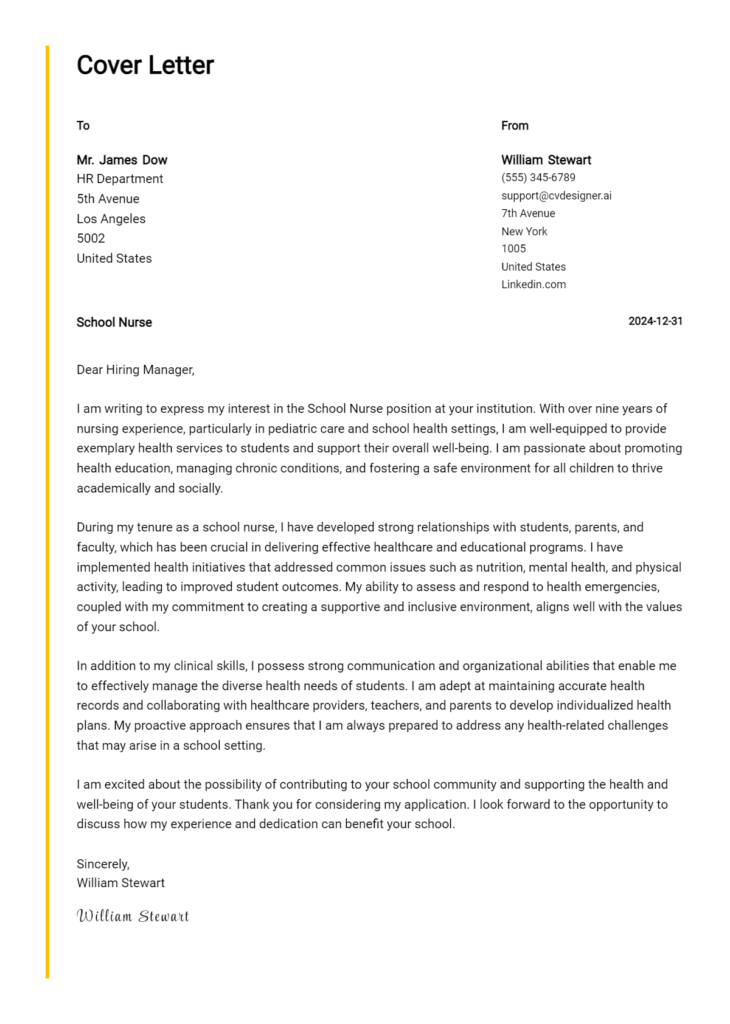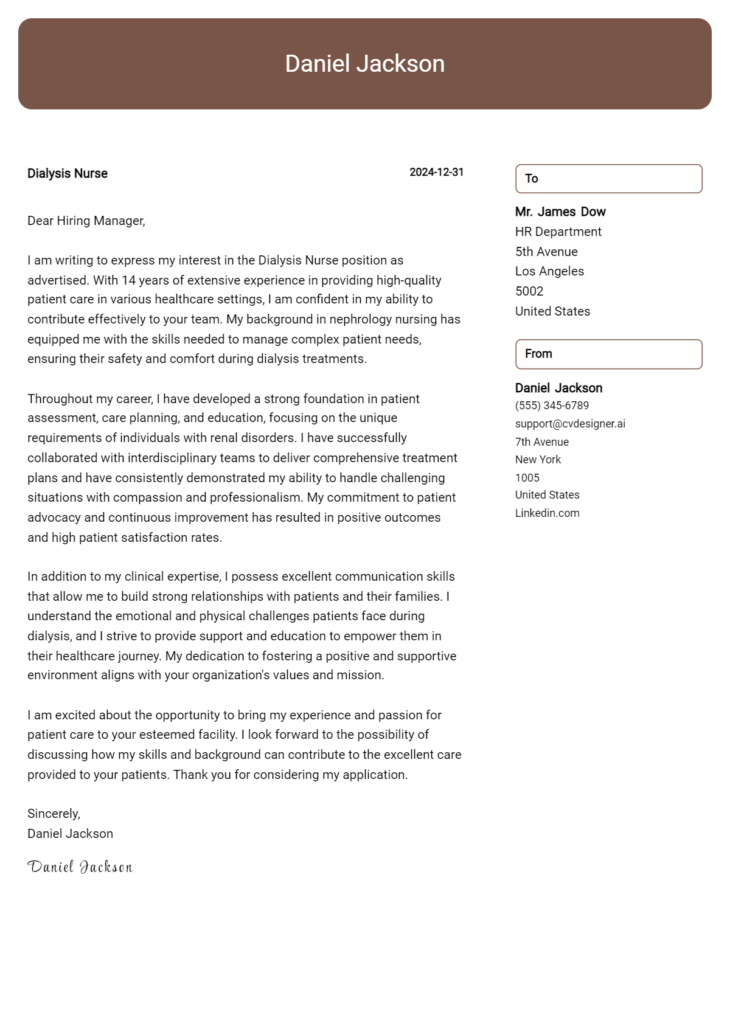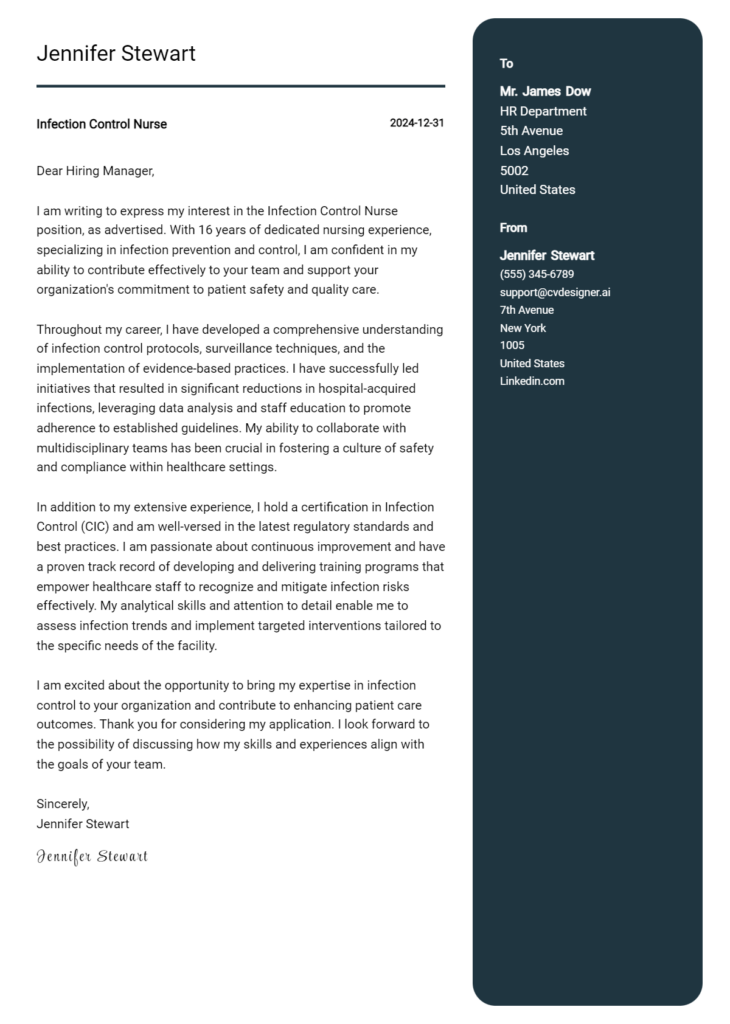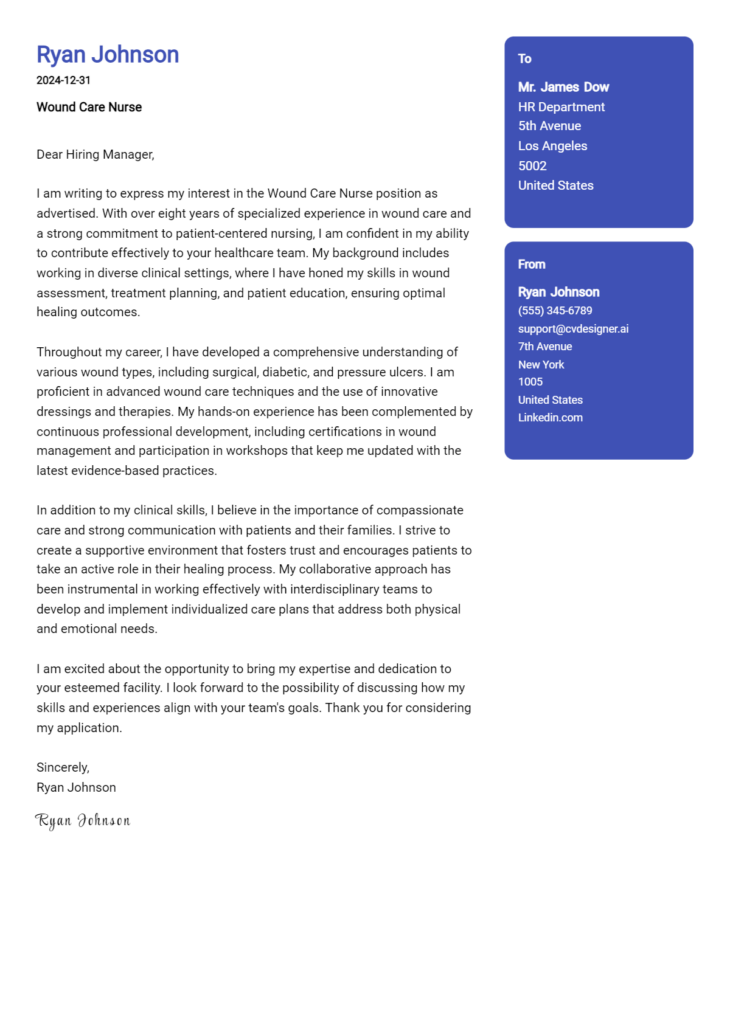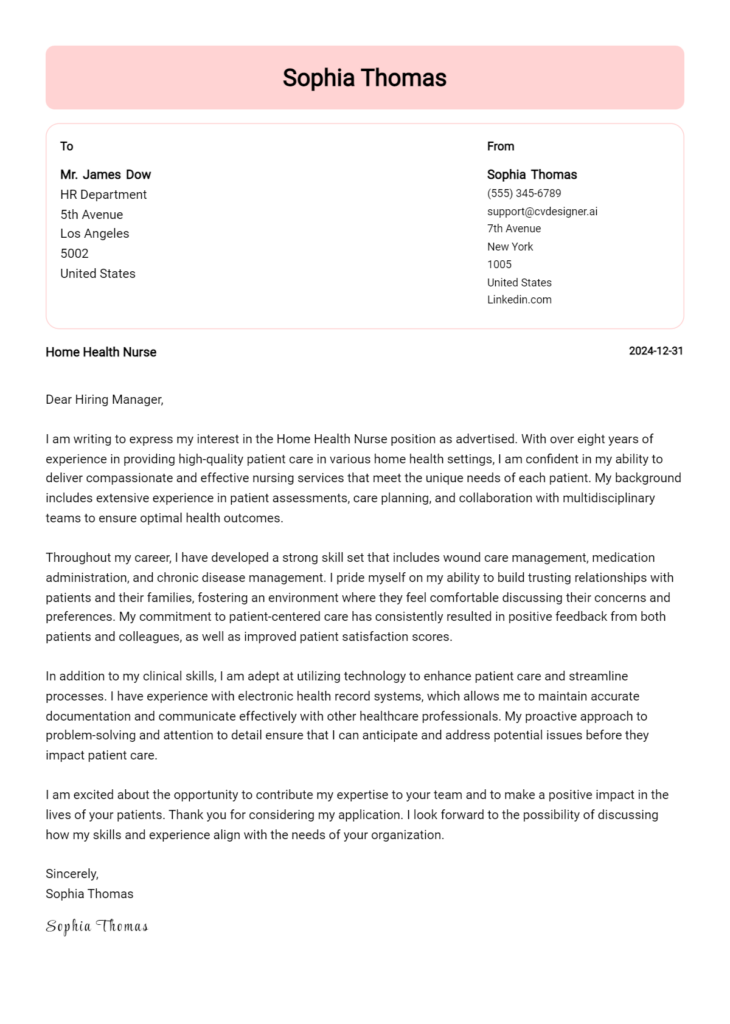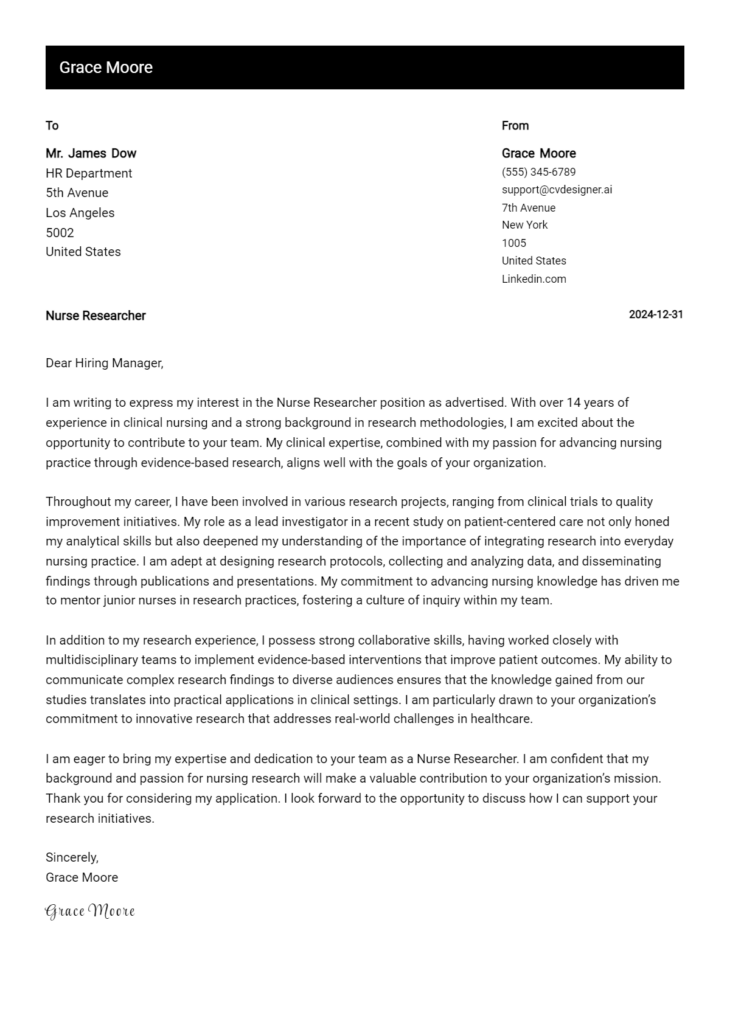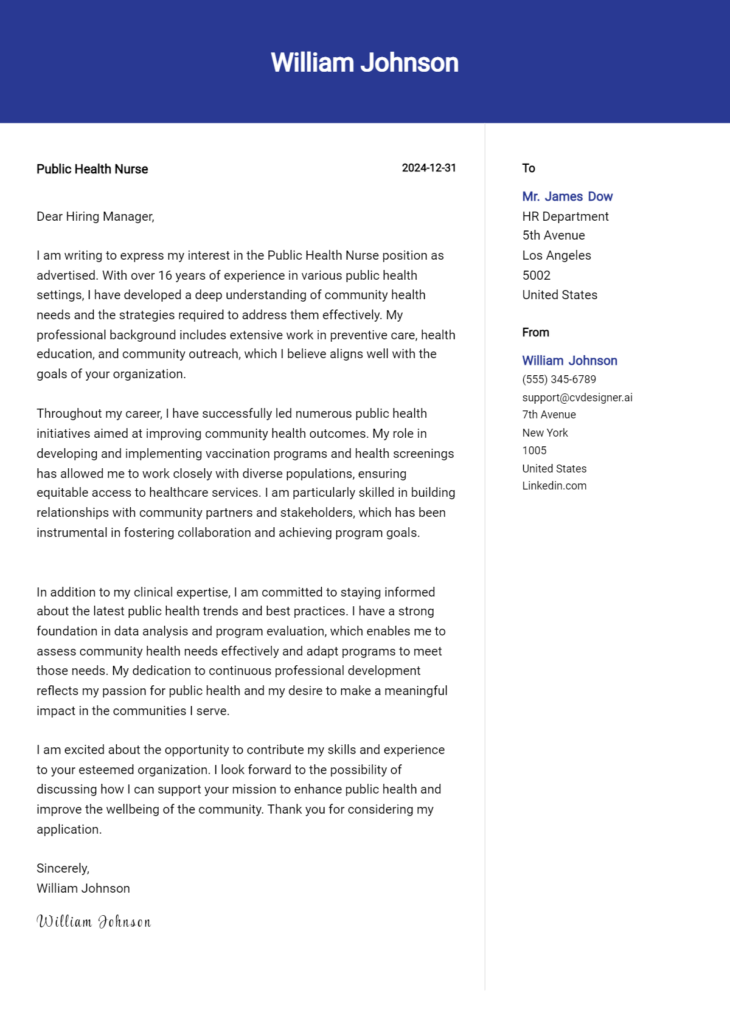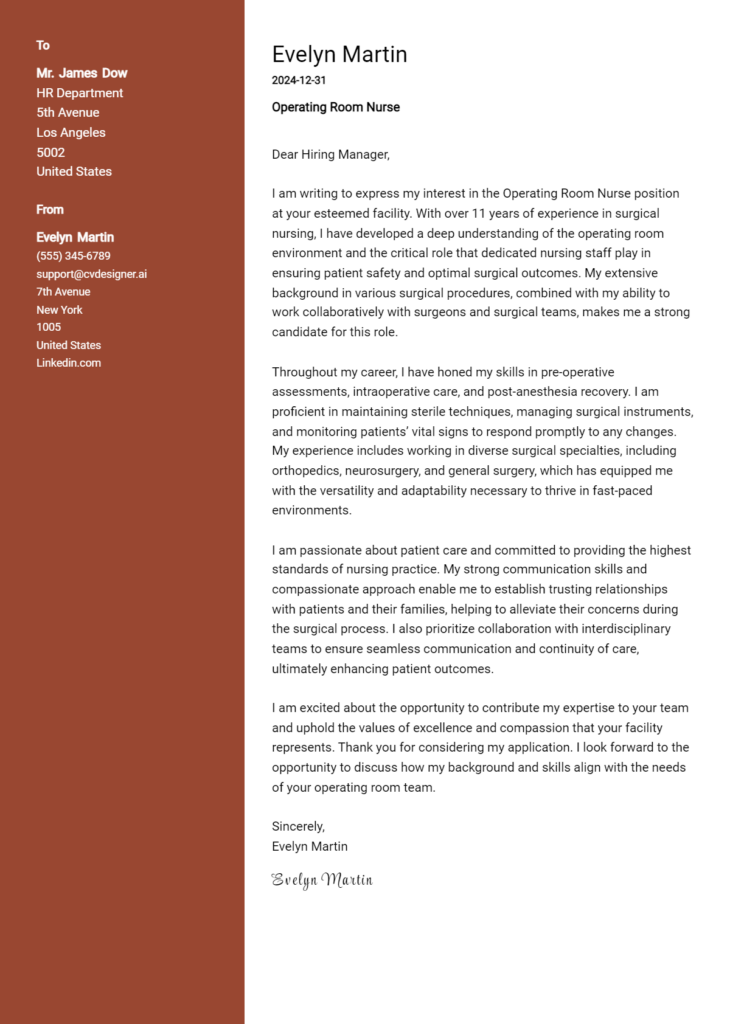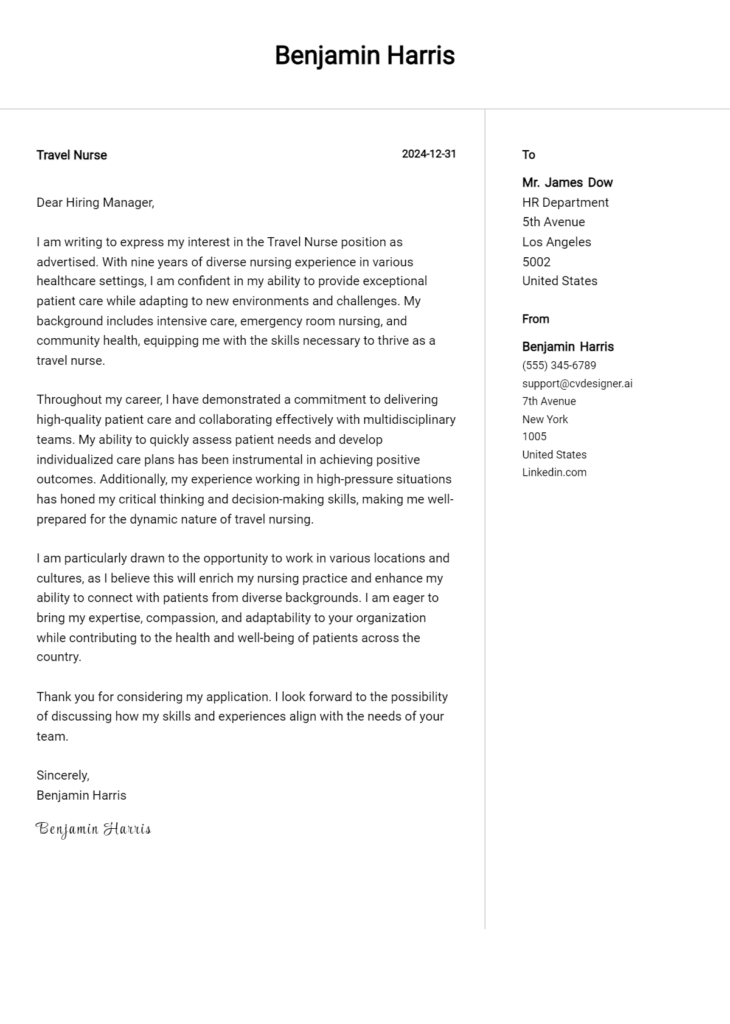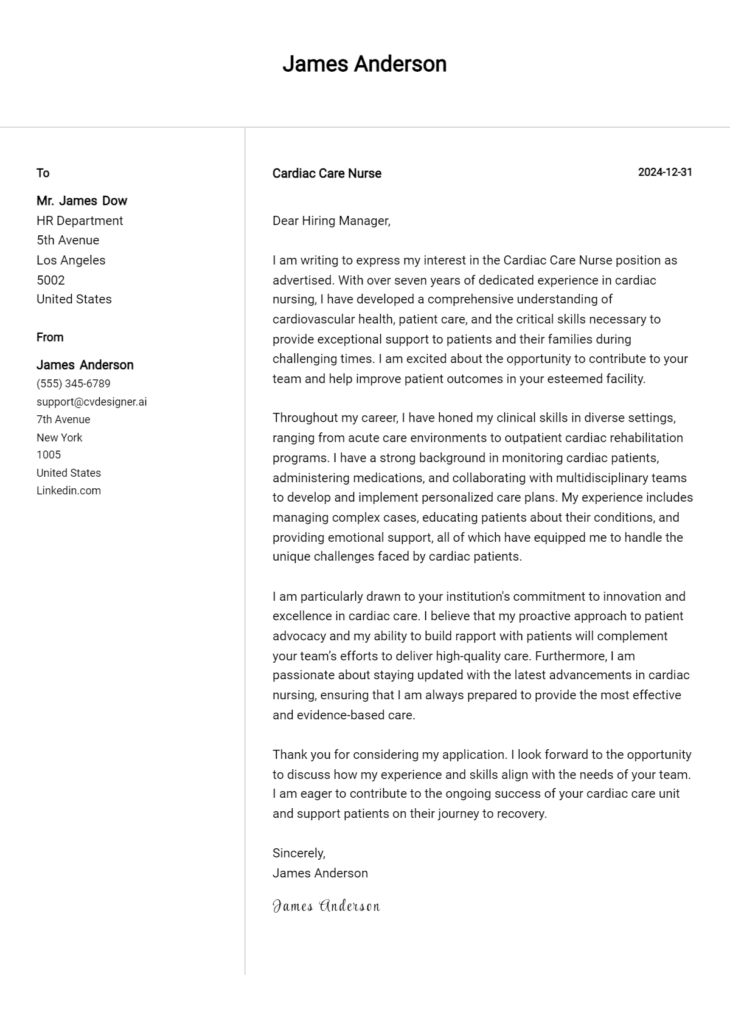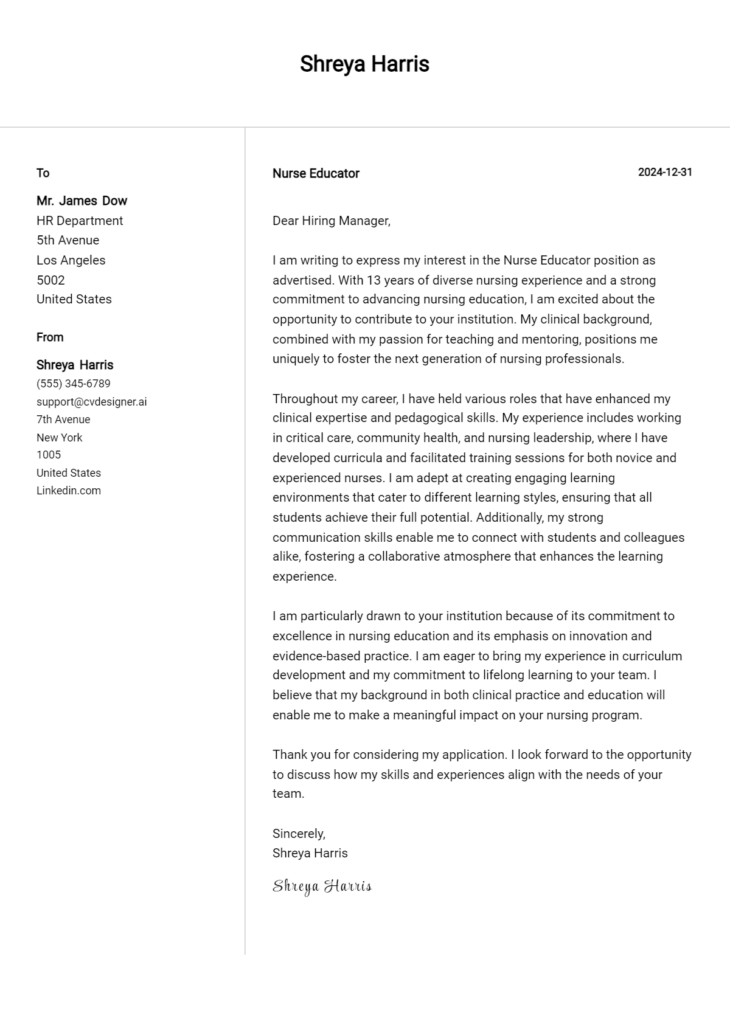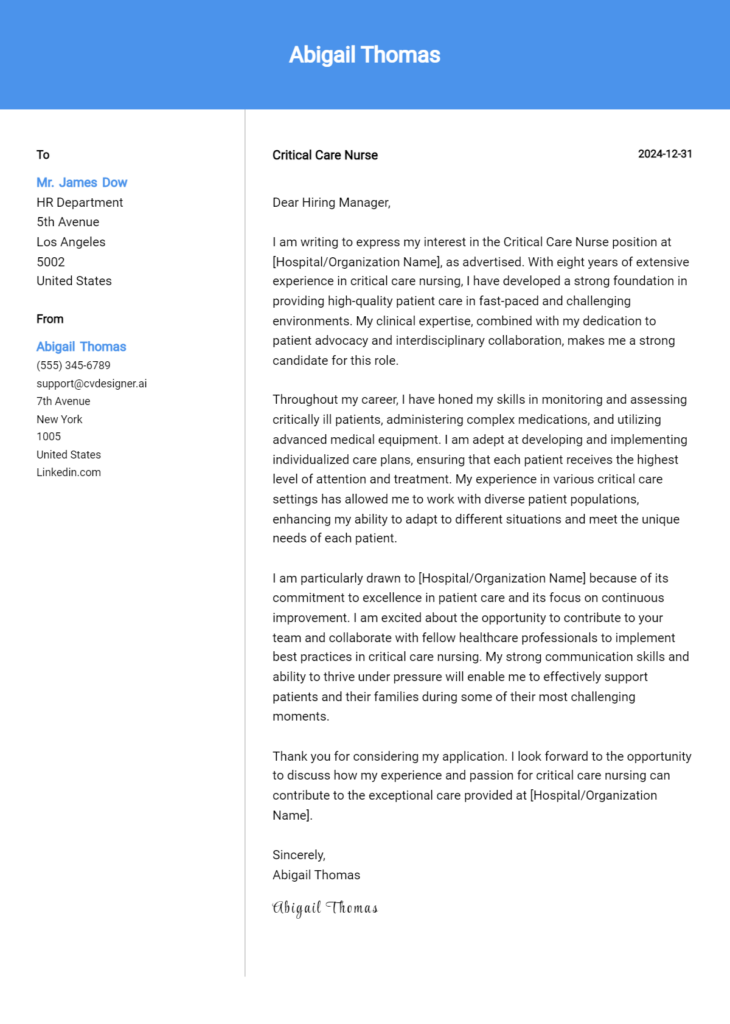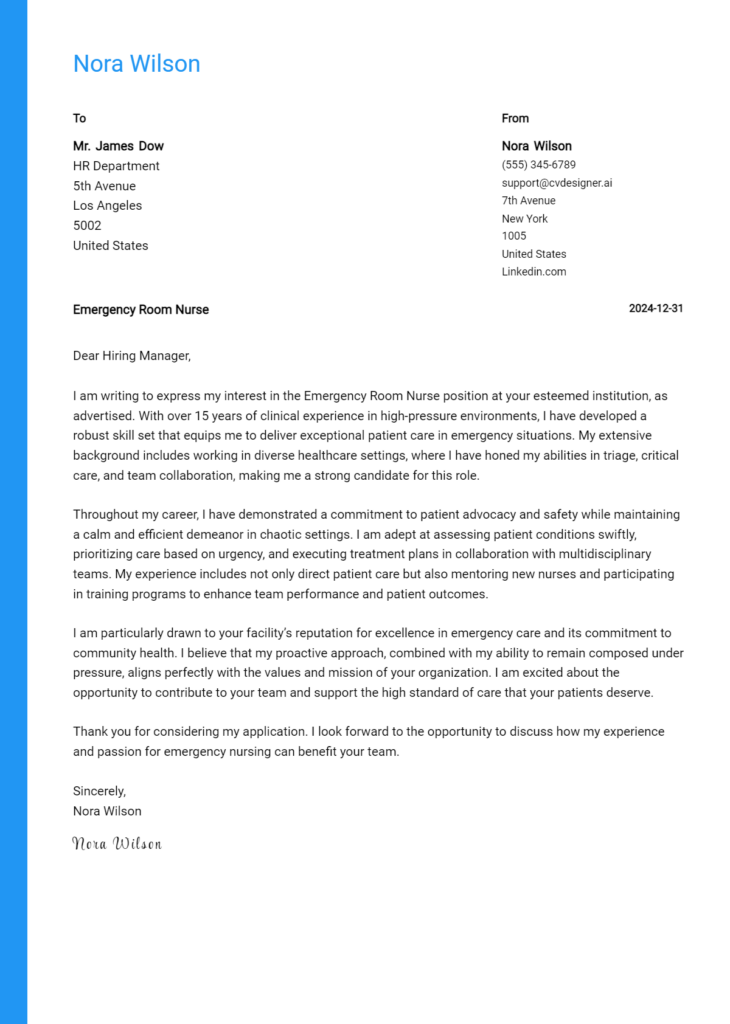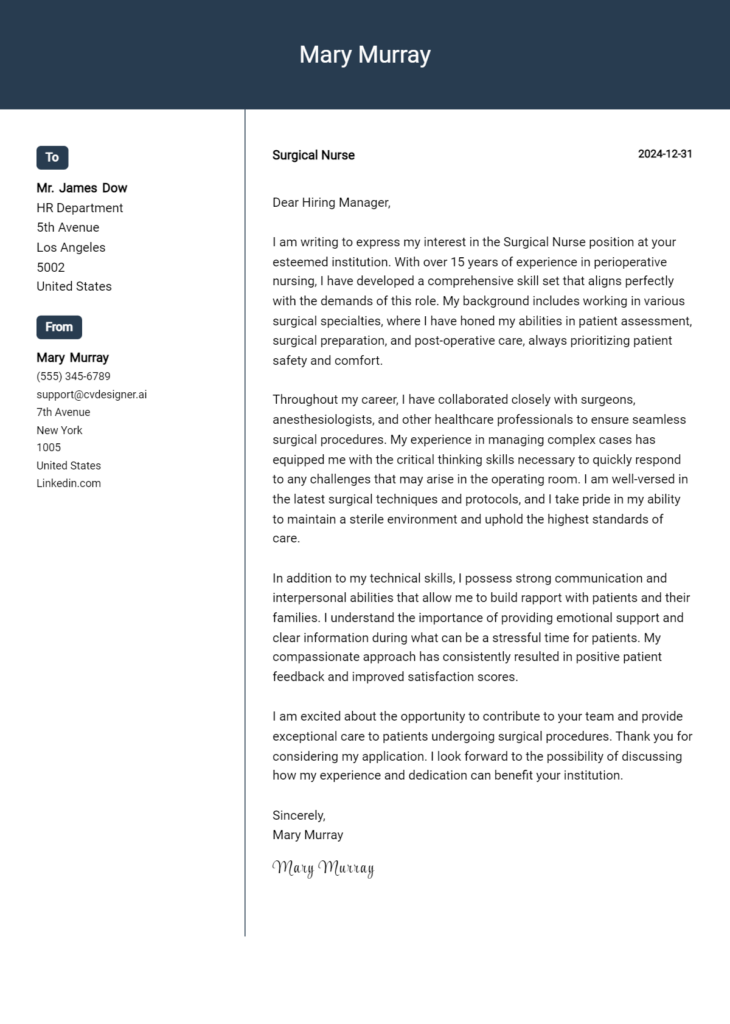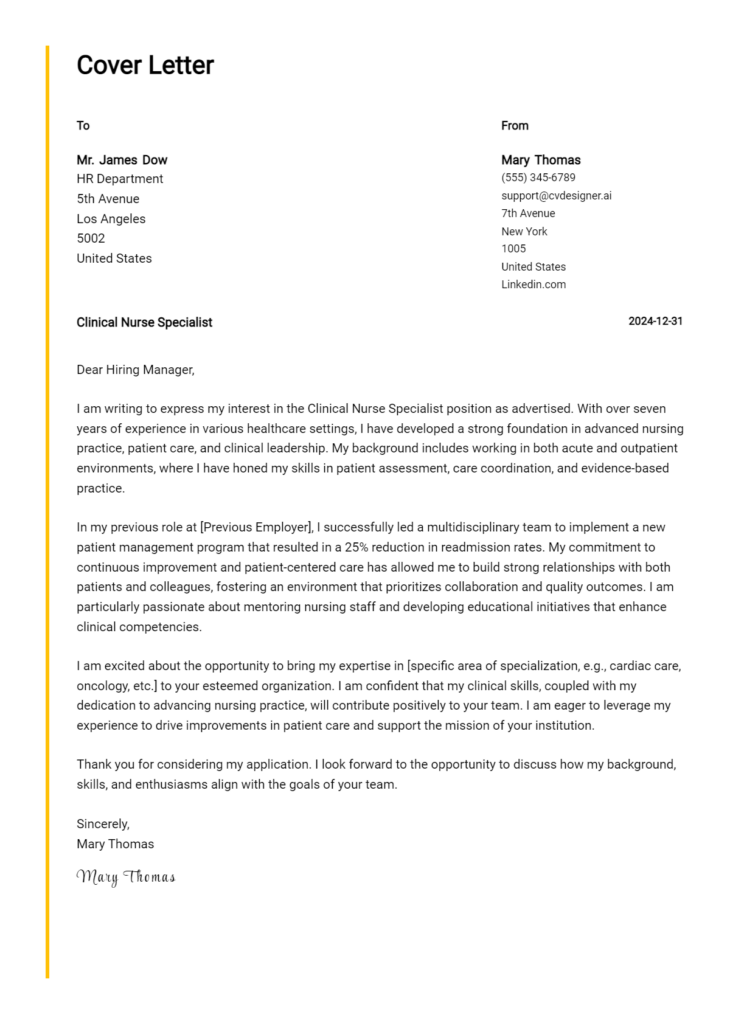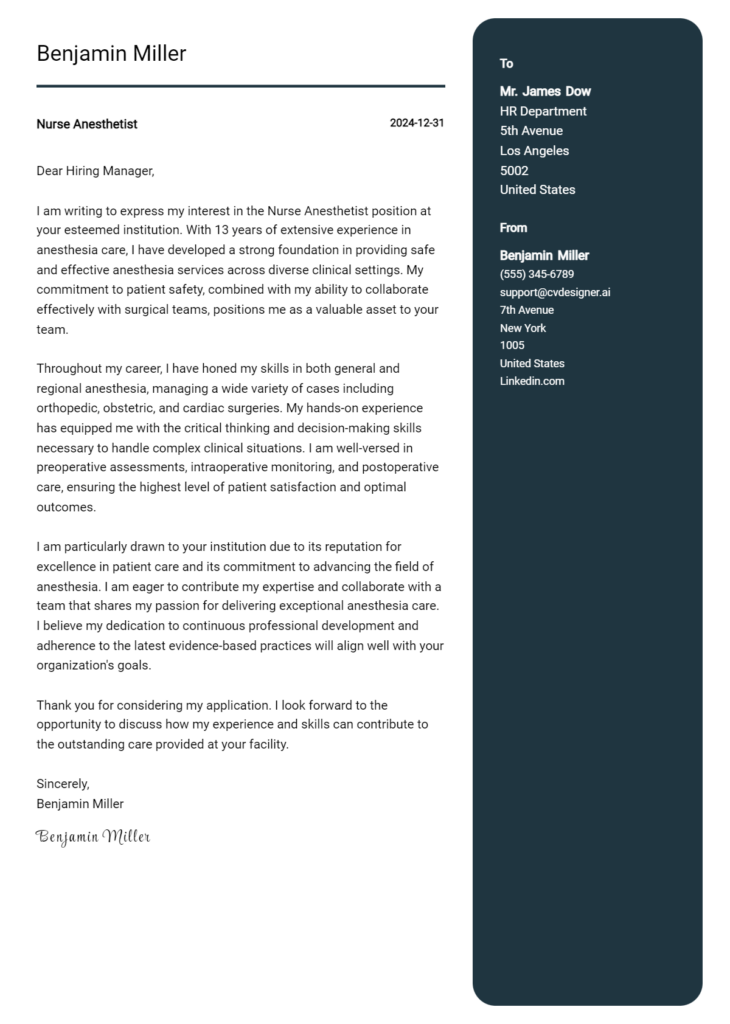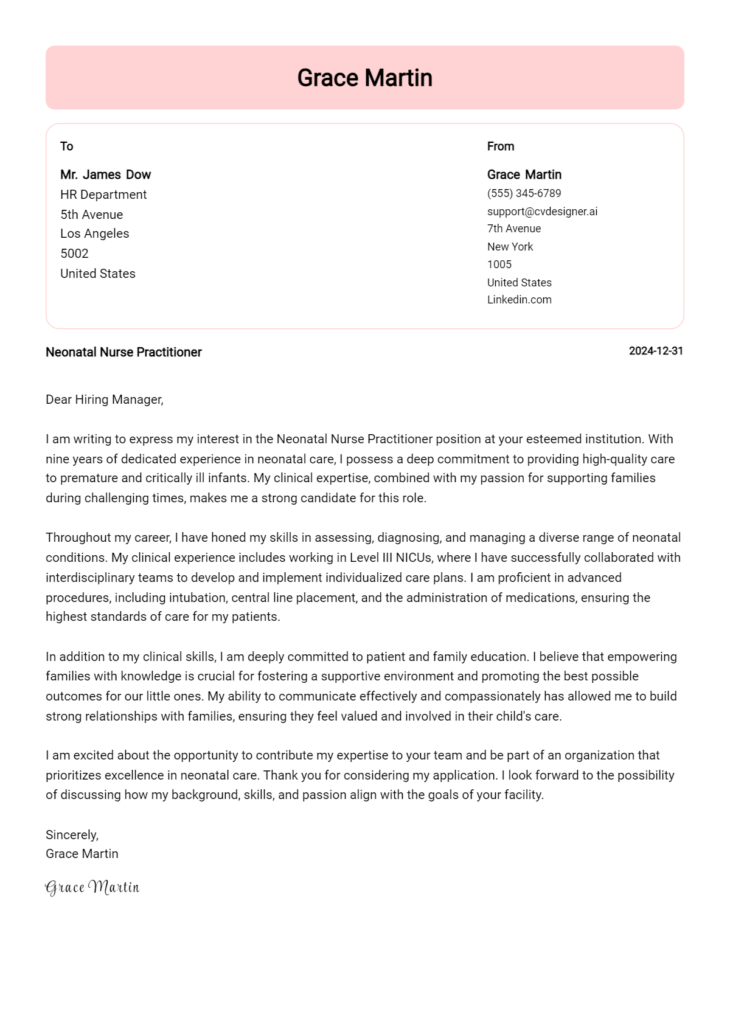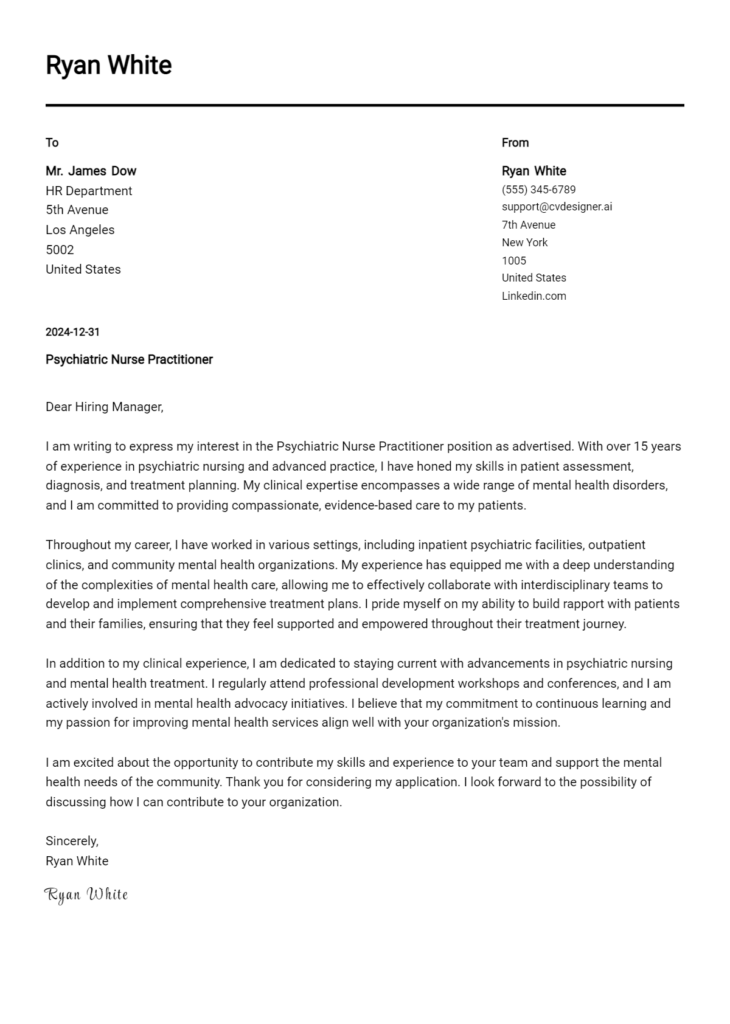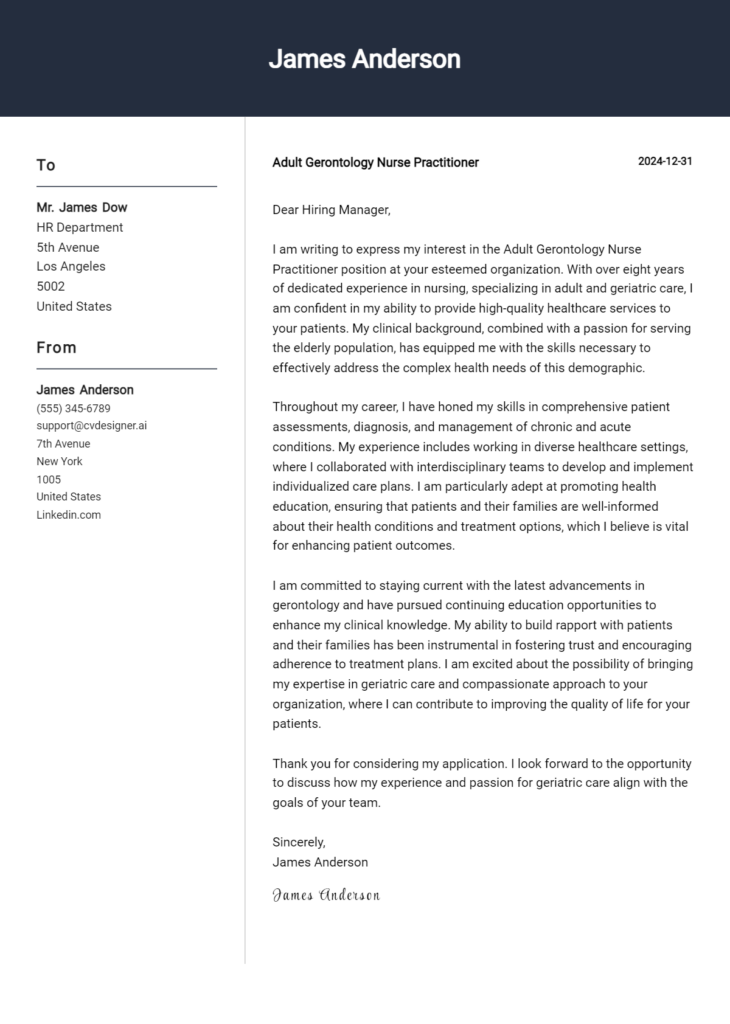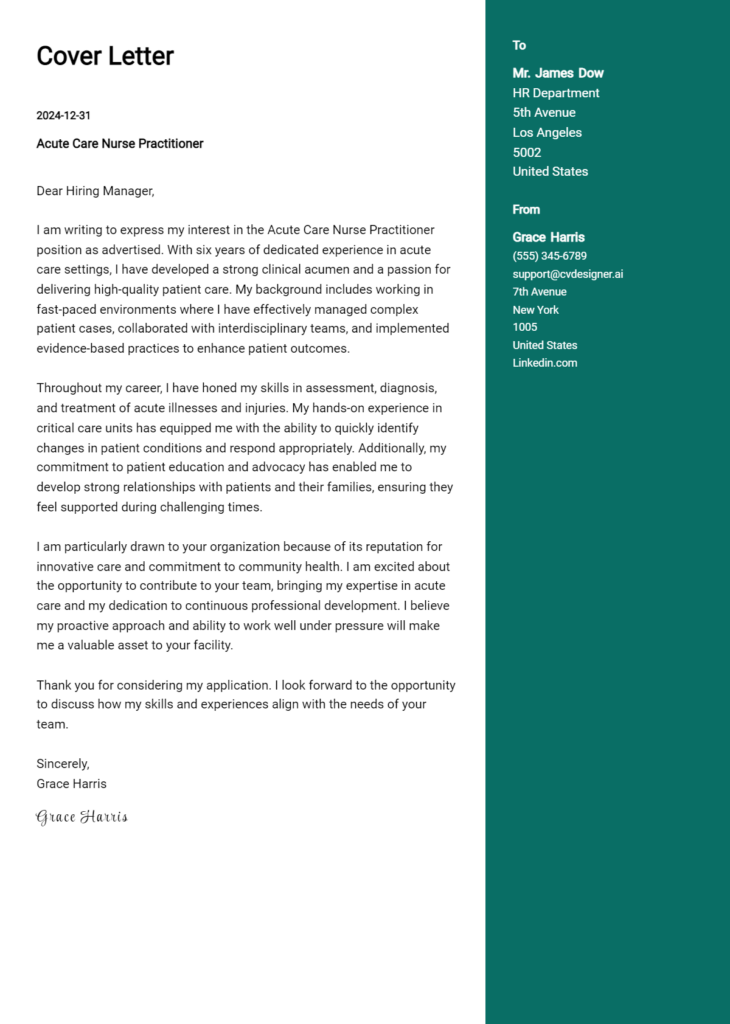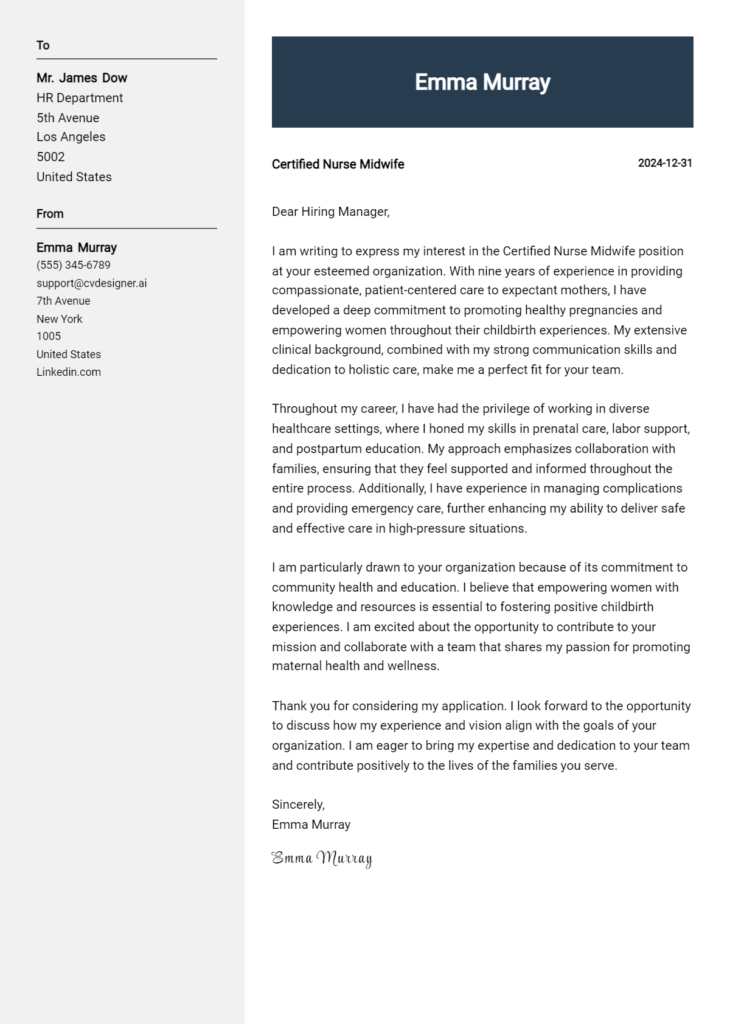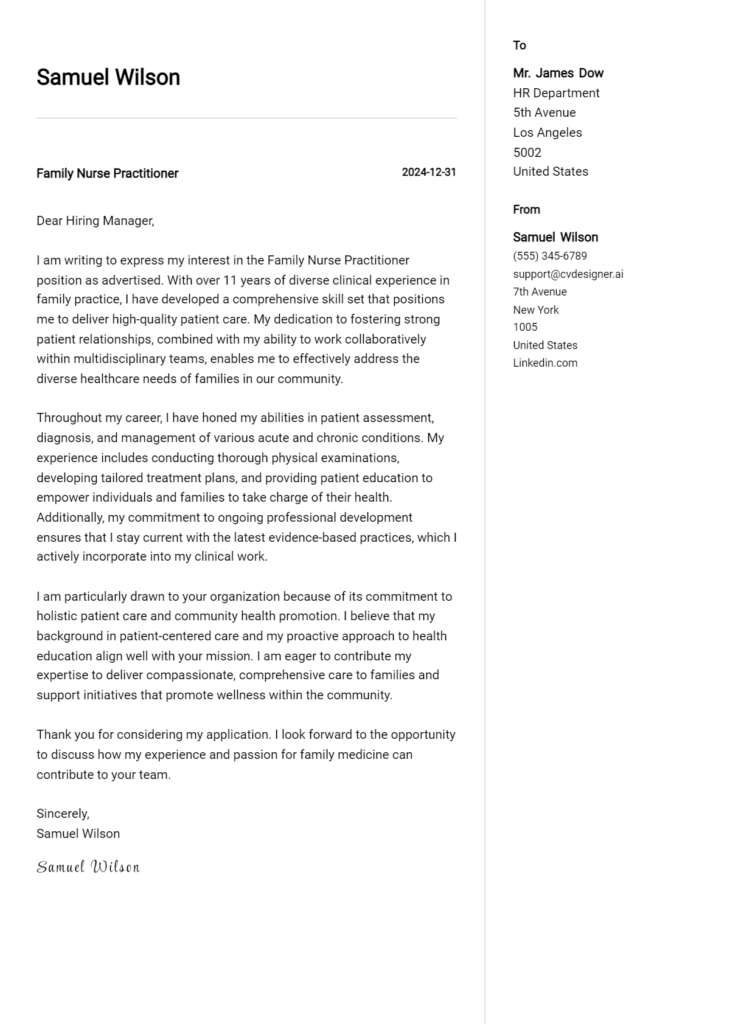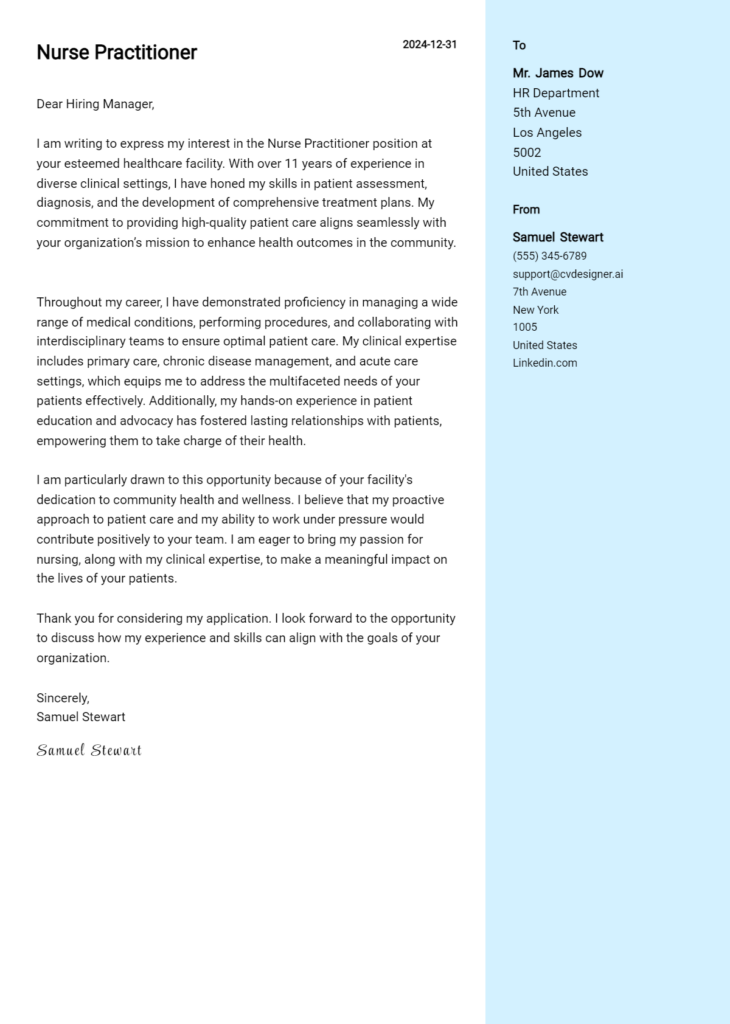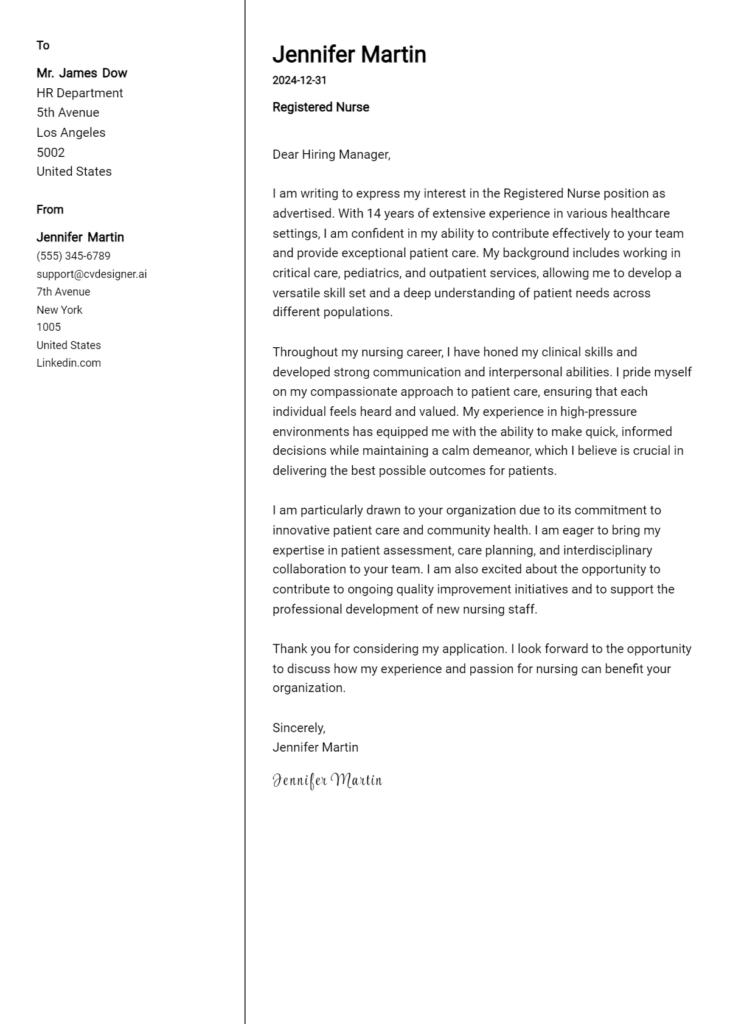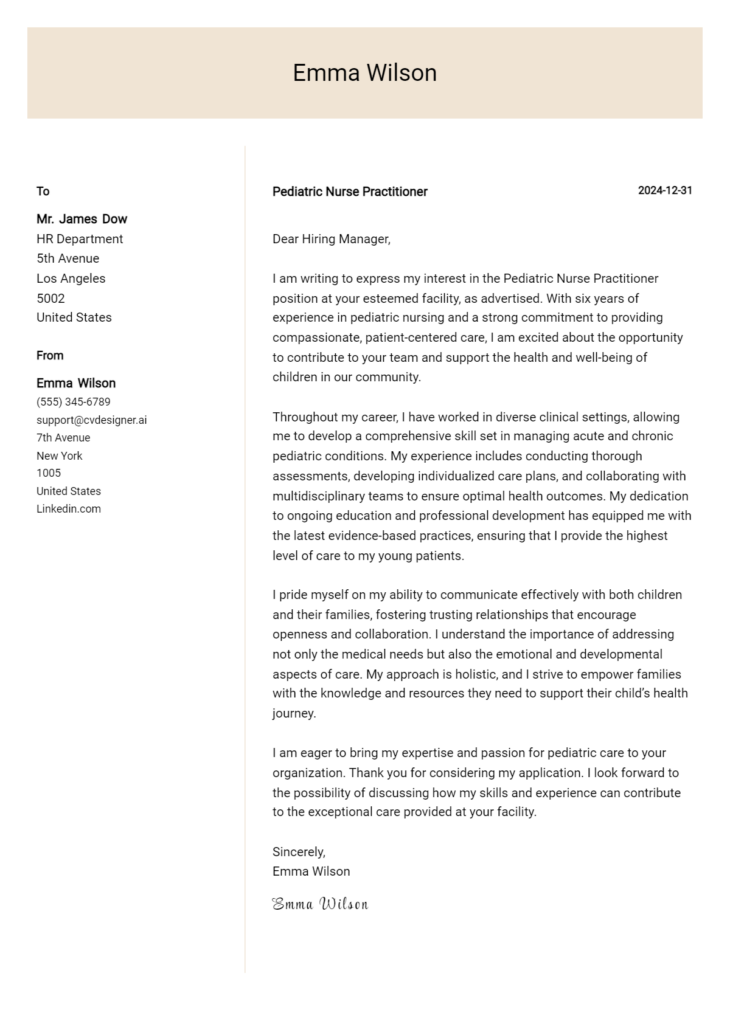Oncology Nurse Cover Letter Examples
Explore additional Oncology Nurse cover letter samples and guides and see what works for your level of experience or role.
How to Format an Oncology Nurse Cover Letter
Crafting a compelling cover letter for an oncology nurse position is essential, as it not only highlights your qualifications but also demonstrates your compassionate nature and commitment to patient care. The format of your cover letter is crucial in making a strong first impression, showcasing your professionalism and attention to detail—qualities that are vital in the nursing field, especially in oncology. A well-structured cover letter helps you connect with the hiring manager, allowing you to express your passion for oncology nursing and your ability to provide empathetic patient care.
In this guide, we will outline how to effectively structure your cover letter, providing insights and oncology nurse-specific examples to help you create a powerful document.
We will focus on the essential components of a professional cover letter, including:
- Cover Letter Header
- Cover Letter Greeting
- Cover Letter Introduction
- Cover Letter Body
- Cover Letter Closing
Each section is key to emphasizing your qualifications and dedication. Let’s break down each part to ensure your oncology nurse cover letter stands out.
Importance of the Cover Letter Header for an Oncology Nurse
A well-structured cover letter header is essential for an Oncology Nurse, as it sets the tone for the entire document and establishes a professional image. The header should provide clear contact information, the date, and the recipient's details, ensuring easy communication and a polished presentation. A strong and precise header reflects the nurse’s attention to detail, which is crucial in the healthcare environment.
Here are examples of a strong and weak cover letter header for an Oncology Nurse:
Strong Example
Jane Doe 123 Health Lane Cancer City, CA 90001 (555) 123-4567 jane.doe@email.com October 1, 2023 Mr. John Smith Director of Nursing Cancer Care Hospital 456 Medical Blvd Cancer City, CA 90002
Weak Example
Jane 10/1/23 To Whom It May Concern
Importance of the Cover Letter Greeting
The greeting of your cover letter plays a crucial role in establishing the tone for the entire document. It is the first point of contact between you and the potential employer, setting a professional atmosphere and demonstrating your attention to detail. A personalized greeting that addresses the hiring manager by name shows that you have taken the time to research the organization and are genuinely interested in the position. This level of professionalism can help you stand out among other candidates. To avoid generic greetings, which can come across as impersonal, make an effort to find out the name of the hiring manager, if possible. This small step can significantly enhance the impact of your cover letter.
Strong Greeting Example
Dear Ms. Smith,
Weak Greeting Example
To Whom It May Concern,
The Importance of a Compelling Cover Letter Introduction for an Oncology Nurse
A well-crafted cover letter introduction is crucial for an Oncology Nurse, as it serves as the first impression to the hiring manager. This opening paragraph should not only capture attention but also convey genuine interest in the role while highlighting key skills or achievements relevant to oncology nursing. A strong introduction sets the tone for the rest of the letter, demonstrating professionalism and a clear understanding of the position. Conversely, a weak introduction may fail to engage the reader, resulting in a missed opportunity to showcase the candidate's qualifications and passion for oncology nursing.
Strong Example
Dear Hiring Manager, As a dedicated Oncology Nurse with over five years of experience in delivering compassionate patient care and managing complex treatment plans, I am excited about the opportunity to join your esteemed oncology team at [Hospital Name]. My extensive background in patient education and support, coupled with my recent certification in chemotherapy administration, positions me uniquely to contribute to your mission of providing exceptional cancer care. I am eager to bring my expertise in evidence-based practices and my commitment to holistic patient support to your organization.
Weak Example
To Whom It May Concern, I am writing to apply for the Oncology Nurse position. I have worked in nursing for a few years and think I would be a good fit for the job. I have some experience with cancer patients, and I hope to help people.
Purpose of the Cover Letter Body for an Oncology Nurse
The body of a cover letter for an Oncology Nurse plays a crucial role in showcasing the candidate's skills, experiences, and overall value to the healthcare organization. It serves as a personal narrative where the candidate can highlight specific projects or accomplishments that demonstrate their proficiency in oncology nursing. By detailing relevant experiences, such as managing complex patient care plans, collaborating with interdisciplinary teams, or contributing to clinical research, the candidate can effectively convey their passion for oncology nursing and their commitment to patient-centered care. This section should not only reflect the candidate's technical capabilities but also their soft skills, such as empathy and communication, which are essential in fostering therapeutic relationships with patients and families.
Strong Example
In my previous role at City Hospital, I successfully led a multidisciplinary team in a project aimed at improving patient education regarding chemotherapy side effects. Through the implementation of interactive workshops and the development of educational materials, we saw a 30% increase in patient satisfaction scores related to treatment understanding. Additionally, I have extensive experience in administering chemotherapy and managing adverse reactions, which has equipped me with a strong foundation in patient advocacy and support. My dedication to continuous learning is evident in my recent certification in oncology nursing, further enhancing my ability to provide high-quality care to patients battling cancer.
Weak Example
I have worked as an Oncology Nurse for a few years and have done typical nurse tasks. I think I am good at my job, and I care about patients. I have also attended some trainings but don’t remember the details. I believe I can be a great addition to your team because I like helping people and have experience in the field.
Importance of the Cover Letter Closing for an Oncology Nurse
The closing paragraph of a cover letter is a critical component, especially for an Oncology Nurse. It provides an opportunity to succinctly summarize your qualifications, reiterate your enthusiasm for the position, and encourage the hiring manager to take the next steps, such as reviewing your resume or scheduling an interview. A strong closing can leave a lasting impression, demonstrating your professionalism and genuine interest in the role. Conversely, a weak closing may fail to convey your passion or assertiveness, leaving the reader unsure about your commitment.
Strong Example
Thank you for considering my application for the Oncology Nurse position at [Hospital/Clinic Name]. With my extensive experience in patient care and my dedication to providing compassionate support to cancer patients, I am excited about the opportunity to contribute to your esteemed team. I look forward to the possibility of discussing my qualifications further and am eager to share how I can support your commitment to exceptional patient care. Please feel free to contact me to schedule an interview at your convenience. Thank you once again for your time and consideration.
Weak Example
I hope you think about my application. I’ve worked in healthcare for a while and I guess I could be a good fit. If you want to talk, just let me know. Thanks for your time.
Crafting an effective cover letter for an Oncology Nurse position is crucial to stand out in a competitive job market. Your cover letter serves as a powerful tool to showcase your technical skills, problem-solving abilities, knowledge of the Software Development Life Cycle (SDLC), teamwork, and a commitment to continuous learning. By highlighting these attributes, you can demonstrate your readiness to provide exceptional patient care in the oncology field. Here are some tips to help you write a compelling cover letter that reflects your qualifications and passion for nursing.
Cover Letter Writing Tips for Oncology Nurse
Highlight Relevant Technical Skills: Emphasize your proficiency with medical technologies and oncology-specific software. Discuss any experience with electronic health records (EHR) and other systems that enhance patient care. This technical expertise reassures employers that you can navigate the tools essential for effective oncology nursing. If needed, you can find helpful cover letter templates that can guide you in structuring your skills effectively.
Demonstrate Problem-Solving Abilities: Oncology nursing often involves complex patient scenarios. Use your cover letter to provide examples of past experiences where you successfully identified patient issues and implemented effective solutions. This could include managing side effects of treatment or coordinating care plans, showcasing your critical thinking and adaptability in challenging situations.
Mention SDLC Knowledge: If you have experience with the Software Development Life Cycle, particularly in healthcare settings, mention it in your cover letter. Discuss how your understanding of SDLC principles can contribute to improved patient care and workflow efficiency, illustrating your ability to bridge the gap between technology and nursing practice.
Emphasize Teamwork and Collaboration: Oncology care requires a multidisciplinary approach. Highlight your experience working in teams, collaborating with physicians, social workers, and other healthcare professionals. Provide specific examples of how you contributed to team dynamics and patient outcomes, reinforcing your ability to thrive in a collaborative environment.
Show Your Passion for Continuous Learning: The field of oncology is constantly evolving, making lifelong learning essential. Share any relevant continuing education courses, certifications, or professional organizations you are involved with. This commitment to staying updated with the latest advancements in oncology nursing demonstrates your dedication to providing the best care possible.
By following these tips and using tools like a cover letter builder to streamline the writing process, you can create a cover letter that effectively captures your qualifications and enthusiasm for the oncology nursing role.
Common Mistakes to Avoid in a Oncology Nurse Cover Letter
Crafting a compelling cover letter is essential for standing out in the competitive field of oncology nursing. Avoiding common mistakes can significantly enhance your chances of success. Here are some frequent pitfalls and tips to steer clear of them:
Generic Greetings: Avoid using "To Whom It May Concern." Instead, research the hiring manager's name for a personal touch.
Lack of Specificity: Failing to tailor your letter to the specific job can make it seem generic. Highlight relevant experiences and skills related to the oncology position you're applying for.
Ignoring Formatting: A poorly formatted cover letter can be off-putting. Follow a professional cover letter format to ensure clarity and readability.
Overloading with Jargon: While medical terms may be important, using excessive jargon can confuse readers. Aim for a balance by explaining your qualifications in layman's terms when necessary.
Neglecting to Showcase Passion: Oncology nursing requires compassion and dedication. Don't just list qualifications; express your passion for the field and patient care.
Repetitive Content: Avoid repeating information from your resume. Use the cover letter to elaborate on experiences or explain how they relate to the job.
Typos and Errors: Proofreading is crucial. Spelling and grammatical errors can undermine your professionalism. Always review your letter or have someone else check it.
By steering clear of these mistakes, you can create a powerful cover letter that showcases your qualifications and enthusiasm for the role. For inspiration, refer to these cover letter examples to help guide your writing.
Cover Letter FAQs for Oncology Nurse
What should I include in my cover letter as an Oncology Nurse?
In your cover letter, you should highlight your relevant nursing experience, particularly in oncology. Start with a strong introduction that states your interest in the position and your passion for oncology nursing. Include specific examples of your skills, such as administering chemotherapy, managing pain, and providing patient education. Mention any certifications, like OCN (Oncology Certified Nurse), and your ability to work in a multidisciplinary team. Additionally, discuss your compassionate approach to patient care, emphasizing your experience in supporting patients and their families during difficult times. Finally, conclude with a strong statement of your eagerness to contribute to the institution and your availability for an interview.
How can I make my cover letter stand out?
To make your cover letter stand out, customize it for each job application. Research the institution and reflect their values and mission in your letter. Use specific examples from your experience that align with the requirements of the job. Incorporate relevant keywords from the job description to demonstrate your fit for the role. Additionally, convey your passion for oncology nursing by sharing a personal story or a lesson learned from your work. A well-structured, error-free letter with a professional tone will also leave a favorable impression. Finally, express enthusiasm about the opportunity and how you can add value to their team.
Should I mention my clinical skills and experience in the cover letter?
Yes, mentioning your clinical skills and experience in your cover letter is crucial, especially in a specialized field like oncology nursing. Highlight key competencies such as your proficiency in chemotherapy administration, patient assessment, and symptom management. Discuss your experience with specific patient populations, such as those with breast cancer or hematological malignancies, to showcase your expertise. Providing quantitative evidence, like improved patient outcomes or successful educational programs you’ve led, can strengthen your case. Tailor these details to the job requirements to demonstrate how your skills align with the needs of the employer, making you a strong candidate for the position.
How do I address gaps in my employment history in my cover letter?
Addressing gaps in your employment history can be approached with transparency and positivity. Briefly explain the reason for the gap, whether it was due to personal circumstances, furthering education, or caregiving responsibilities. Focus on what you accomplished during that time, such as pursuing additional certifications, volunteering in healthcare settings, or engaging in professional development activities. Convey how these experiences have enhanced your skills and prepared you for a role in oncology nursing. Keep the tone optimistic, and emphasize your readiness to contribute positively to the team. By framing the gap constructively, you can reassure employers about your commitment and capability as a candidate.
Build your Cover Letter in minutes
Use an AI-powered cover letter builder and have your letter done in 5 minutes. Just select your template and our software will guide you through the process.

